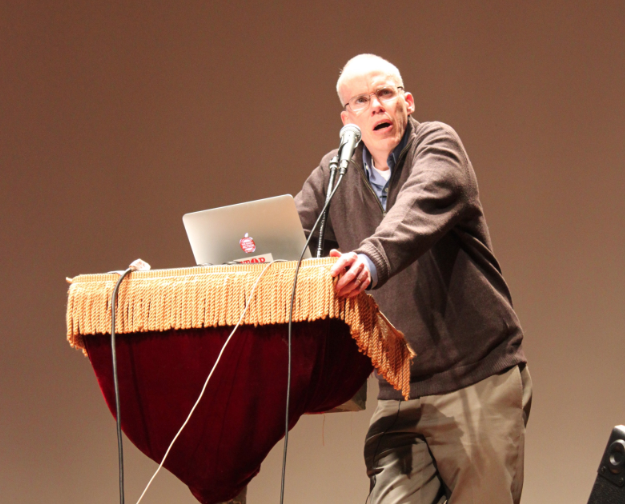
For the past six months, author and environmentalist Bill McKibben has been leading a national campaign for divestment, a term used to describe the shedding of stocks and investments deemed unethical or immoral. Since then, the movement has spread across college campuses and now already 256 universities petitioned divestment from fossil fuel companies.
“Many colleges are so invested in the idea of sustainability and have spent so much time bragging on their websites about how green they are that it would be a little odd to say that it applies just to the dining hall and not to the portfolio,” McKibben said.
McKibben went on a 21-day, 21-city tour in November to spread the movement of divestment. His proposal is simple: increase pressure on university administrations to divest, which will attract governments to follow suit. He said that eventually oil companies will have to take notice.
McKibben’s goal, backed by partners such as the Energy Action Coalition, The Sierra Students Coalition, and the Responsible Endowments Coalition, is to rally college students to stop their universities from investing in fossil fuel.
“We won’t bankrupt Exxon,” McKibben said. “What we are going to do is take away some of their social license.”
Earlier this month, McKibben spoke at Cooper Union’s Great Hall to a room filled with approximately 550 students, alumni, and faculty from New York City schools. Students from The New School, Hunter College, and NYU attended.
“It gave many of us a chance to network,” said Brandt Weathers, a member of The New School’s Advisory Committee on Investor Responsibility. “There are so many organizations and people in the greater NYC area that are working toward the same goals as the ACIR.”
After publishing an article in the August 2012 Rolling Stone issue, which featured Justin Bieber on the cover, McKibben received a phone call from his editor.
“Your piece has ten times as many likes on Facebook as Justin Bieber,” his editor said.
The article discusses the agreement among our political leaders that the global temperature shouldn’t increase by more than two degrees celsius. However, McKibben argued that the amount of carbon contained in oil reserves, which is also the amount major oil companies plan to burn, is about five times the “safe” number.
McKibben knows that the movement has grown exponentially among the general public since the release of his first book in 1989. Along with the divestment movement, McKibben and 350.org are now gearing up for another environmental fight: the rally against the Keystone XL pipeline that takes place in Washington, D.C. today. They expect over 20,000 participants, which will make this event the largest climate change rally yet. They are also preparing for an international conference on climate change which will be held in Istanbul in June.
“One of the things about climate change is there is no one thing that will ever be enough,” McKibben said. “We have to do about 20 things and they all have to succeed, and they all have to succeed all over the world.”







Leave a Reply